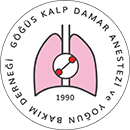

The use of Therapeutic Hypothermia in Patients Having Cardiac Arrest
Gönül Erkan1, Buket Özyaprak2, Ferdane Aydoğdu Kaya1, Dursun Topal3, Yılmaz Apaydın2, Nail Kahraman4, Ayşe Baysal51Department of Anesthesiology and Reanimation, University of Health Sciences, Ahi Evren Training and Research Hospital, Trabzon, Türkiye2Department of Anesthesiology and Reanimation, University of Health Sciences, Bursa Yüksek Ihtisas Training and Research Hospital, Bursa, Türkiye
3Department of Cardiology, Bursa City Hospital, Bursa, Türkiye
4Department of Cardiovasculary Surgery, Bursa City Hospital, Bursa, Türkiye
5Department of Anesthesiology and Reanimation, Pendik Bölge Hospital, İstanbul, Türkiye
Objectives: Therapeutic hypothermia (TH) is applied to regain the quality of life in patients whose spontaneous blood circulation returns after cardiopulmonary resuscitation (CPR). In our study, we investigated the effects of TH after CPR.
Methods: The findings of patients who underwent TH (Group 1, n=32) were compared with those of normothermic patients (Group 2, n=37) in this retrospective study. Recorded data were demographic data, comorbid diseases, causes of cardiac arrest, cardiac arrest rhythms, return times of spontaneous circulation, Glasgow coma scale, deep tendon reflex and brainstem reflex, extubation times, durations of intensive care unit (ICU) stay, and complications.
Results: Extubation time in Group 1 (4.74±2.80 days) was shorter than in Group 2 (9.55±10.16 days). The length of stay in the ICU was shorter in Group 1 (7.96±5.10 days) compared to in Group 2 (13.40±11.40 days). Incidence of epileptic seizure activity was lower in Group 1 (16.2%) than in Group 2 (46.9%). Although Glasgow coma scale score evaluated at discharge was higher in Group 1, this difference was not statistically significant (p>0.05).
Conclusion: We consider that the use of TH in patients whose spontaneous blood circulation was restored by CPR procedure after cardiac arrest has significant and positive effects on recovering the quality of life.
Keywords: Cardiopulmonary resuscitation, normothermia, therapeutic hypothermia
Kardiyak Arrest Gelişen Hastalarda Terapötik Hipotermi Uygulaması
Gönül Erkan1, Buket Özyaprak2, Ferdane Aydoğdu Kaya1, Dursun Topal3, Yılmaz Apaydın2, Nail Kahraman4, Ayşe Baysal51Sağlık Bilimleri Üniversitesi, Ahi Evren Eğitim ve Araştırma Hastanesi, Anesteziyoloji ve Reanimasyon Anabilim Dalı, Trabzon, Türkiye2Sağlık Bilimleri Üniversitesi, Bursa Yüksek İhtisas Eğitim ve Araştırma Hastanesi, Anesteziyoloji ve Reanimasyon Anabilim Dalı, Bursa, Türkiye
3Bursa Şehir Hastanesi, Kardiyoloji Bölümü, Bursa, Türkiye
4Bursa Şehir Hastanesi, Kalp Damar Cerrahisi Anabilim Dalı, Bursa, Türkiye
5Pendik Bölge Hastanesi, Anesteziyoloji ve Reanimasyon Anabilim Dalı, İstanbul, Türkiye
Amaç: Kardiyopulmoner resüsitasyon sonrası spontan kan dolaşımı geri dönen hastalarda yaşam kalitesinin yeniden kazanılmasında terapötik hipotermi uygulanmaktadır. Çalışmamızda kardiyopulmoner resüsitasyon sonrası terapötik hipoterminin etkilerini araştırdık.
Yöntem: Bu retrospektif çalışmada terapötik hipotermi yapılan hastaların (Grup 1, n=32) bulguları normotermik hastaların (Grup 2, n=37) bulguları ile karşılaştırıldı. Kaydedilen veriler; demografik veriler, komorbid hastalıklar, kardiyak arrest nedenleri, kardiyak arrest ritimleri, spontan dolaşım dönüş süreleri, Glasgow koma skalası, derin tendon refleksi ve beyin sapı refleksi, ekstübasyon süreleri, yoğun bakımda kalış süreleri ve komplikasyonlardır.
Bulgular: Ekstübasyon süresi Grup 1de (4,74±2,80 gün) Grup 2den (9,55±10,16 gün) daha kısaydı. Yoğun bakımda kalış süresi Grup 1de (7,96±5,10 gün) Grup 2ye (13,40±11,40 gün) göre daha kısaydı. Epileptik nöbet aktivitesinin insidansı Grup 1de (%16,2) Grup 2ye (%46,9) göre daha düşüktü. Grup 1de taburculukta değerlendirilen Glasgow koma skalası skoru daha yüksek olmasına rağmen bu fark istatistiksel olarak anlamlı değildi (p>0,05).
Sonuç: Kardiyak arrest sonrası kardiyopulmoner resüsitasyon işlemi ile spontan kan dolaşımı düzelen hastalarda terapötik hipotermi kullanımının yaşam kalitesinin düzelmesi üzerinde önemli ve olumlu etkileri olduğunu düşünüyoruz.
Anahtar Kelimeler: Kardiyopulmoner resüsitasyon, normotermi, terapötik hipotermi
Manuscript Language: English
(1000 downloaded)

















